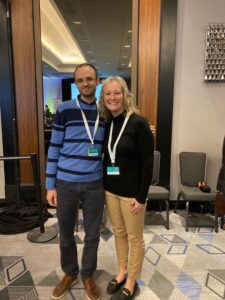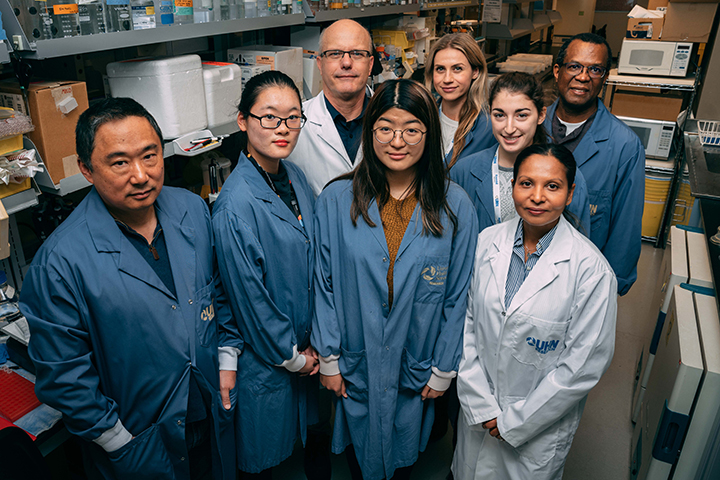Research Grant Opportunities
CDKL5 Canada is committed to funding innovative research to find treatments and a cure for CDKL5 Deficiency Disorder.
If you are a scientist or clinician who is seeking funding for CDD research, please submit a short (1-2 pages) Letter of Intent to Natalie Ladly (nladly@cdkl5canada.ca) outlining your background, project goals, timeline, rough budget, and current and pending support. There are no deadlines for submission.
Previously Issued Grants:
2023 Grant Issued to Dr. James Eubanks for continued CDD research
|
CDKL5 Canada is pleased to announce that we are granting the laboratory of Dr. James Eubanks a $50,000 grant to support his continued efforts towards CDD research. Dr. Eubanks and his team work at the Krembil Research Institute in Toronto and they have been researching CDD for many years. They are doing some exciting work right now and Dr. Eubanks has agreed to share some insight into their research with our donors.
“Our group is investigating CDD using patient specific and CDKL5-deficient pre-clinical models. Using gene editing tools we have developed a model mouse line that copies a certain mutation type found in some patients with CDD. Using this model, we have performed a number of experiments to identify behavioural and physiological abnormalities caused by this mutation that are consistent with what is seen in CDD patients. Our results reveal that neuronal hyperexcitability, epileptiform activity, and increased seizure susceptibility are readily evident in the mouse, which allows us to test the anti-epilepsy effects of novel therapeutic strategies. In addition, we have also identified autonomic nervous system dysfunction in the mice that is consistent with what is present in many CDD patients, including disrupted sleep patterns and difficulties with body temperature control. To better understand why the loss of CDKL5 leads to CDD, we are performing cellular and molecular experiments to pinpoint systems that are functionally disturbed or disrupted when CDKL5 is absent. These experiments have given us a better understanding of the role of CDKL5 in regulating neural development, and identified cell signaling alterations that can be examined to gauge the beneficial effects of new medications or therapeutic interventions that are being developed in our lab or other labs worldwide. Our main objective is to develop new treatments that will correct the underlying pathology of CDD, and thereby improve the lives of CDD patients and families affected by this condition. We have started our first set of these novel therapeutic intervention experiments in our mouse model, and anxiously awaiting what the outcomes will show. CDKL5 Canada has helped to make these experiments possible, and we look forward to working with the entire CDKL5 community as our work goes forward.” |
2022 Grant Recipient: Dr. Andrea Colarusso

CDKL5 Canada is pleased to announce that we will be issuing a research grant to support Italian scientist Dr. Andrea Colarusso when he joins us in Canada in January 2023. Dr. Colarusso has been working on projects relating to CDKL5 Deficiency Disorder (CDD) since he was a Ph.D. student in 2017. Andrea will be hosted by the Canada Excellence Research Chair on the Microbiome-Endocannabinoidome Axis in Metabolic Health at the University of Laval (Québec, Canada). He will be working in the group led by Prof. Vincenzo di Marzo who is one of the main experts in the study of the endocannabinoid system (eCBS), and he will continue to collaborate with Prof. Elisabetta Ciani’s group at the University of Bologna (Italy), who will prepare the mice samples to be analyzed in Canada.
Andrea’s interest in this field derives from the notion shared in the scientific literature that recalcitrant epilepsy typical of CDD patients may be relieved by phytocannabinoids like cannabidiol. This assumption would suggest that the eCBS may be unbalanced in CDD.
To test this hypothesis, Andrea is going to analyze the eCBS of a CDD mouse model by integrating multiple approaches that measure the levels of endocannabinoids, their receptors, and metabolic enzymes in different anatomical districts. Besides providing new information underlying CDD symptomatology, this detailed study can provide new tools to diagnose CDD and treat CDD-related epilepsy, and can justify the treatment of epilepsy in CDD with phytocannabinoids.
CDKL5 Canada’s President Natalie Ladly had the pleasure of meeting Dr. Colarusso at the CDKL5 Forum in November and they are pictured together above. CDKL5 Canada is committed to supporting exceptional research efforts relating to CDD and we look forward to hearing the results of his study.
2019 CDKL5 Canada Studentship Award

CDKL5 Canada is pleased to announce today that its inaugural trainee fellowship grant has been granted to the laboratory of Dr. James Eubanks at the Krembil Research Institute in Toronto. A cheque for $50,000 was delivered by the President of CDKL5 Canada, Ms Sangeeta Staley, to Dr. Eubanks in his laboratory at the Krembil Discovery Tower on October 17. “It is a pleasure to present this award today, as Dr. Eubanks’ work is indeed breaking new ground towards our understanding of how different mutations of CDKL5 cause CDKL5 Deficiency Disorder-CDD” commented Ms Staley. CDD is a rare X-linked genetic condition which results in early onset, difficult to control seizures and severe neuro-developmental impairment. Due to the location on the X chromosome CDD affects more girls than it does boys.
“Dr. Eubanks’ group has been investigating mechanisms of pathogenesis in different CDD model systems for several years now, and his group has uncovered exciting new directions that will push the search for a CDD cure forward.”
CDKL5 Canada is committed to supporting exceptional research efforts relating to CDD, and this fellowship award will allow Dr. Eubanks’ group to expand their investigations in this area. “Awards like these are essential for our efforts, as they allow us to recruit new people into our lab to work in this specific area” says Dr. Eubanks. “The real bottleneck for our work is not having good ideas to test, but is rather having the right people in the lab who can focus on specific projects that already show promise. This award allows us to dedicate an individual to test one of these ideas, and see whether it will open the door to a new CDD treatment.”
Dr. Eubanks is a Senior Scientist and the Division Head of the Experimental and Translational Neuroscience research program at the Krembil Research Institute. He is also a Professor in the Department of Surgery at the University of Toronto. He has been actively researching CDD since 2014, and gives lectures Nationally and Internationally on his work at CDKL5 scientific conferences and at CDKL5 advocacy group meetings.
